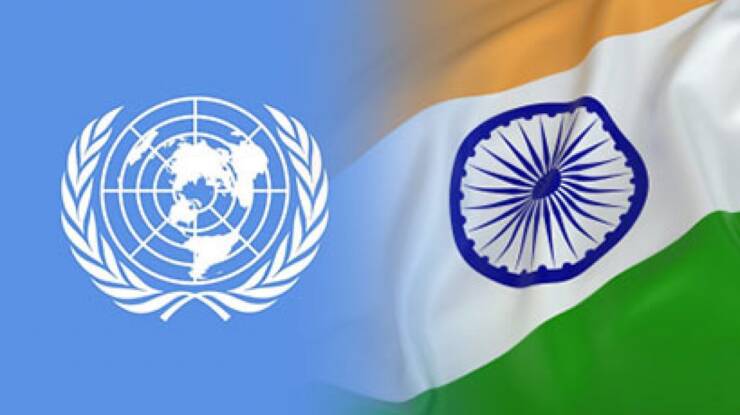
The past seven-and-a-half decades have been chartbusters as far as international politics and geo-economics are concerned. The aftermath of the Second World War witnessed the simultaneous growth of the Cold War between Soviet bloc and US-led allied institutions and the quest for multilateralism and global regulatory institutions.
Bretton Woods institutions like the IMF and World Bank or for that matter WTO need a new lease of life as greater challenges both institutional and representations confront them. They are turning to be inadequate.
The UN and its arms remain wedded to the post WWII paradigm and are simply failing to acknowledge let alone represent the new glaring reality. The UNSC reforms remain a blabber in the biggest Talking Shop. Of course it still provides a forum for disadvantaged countries to at least be able to vent their grievances and express hopes for a better world where they might have a realistic say.
In the meantime, many watershed events have also taken place. The Cold War 1.0 ended with the US emerging as a sole ‘hyper power’ which had the capacity to unilaterally intervene but cannot ensure an outcome thereafter. Its fire power, extensive outreach and technological prowess are unquestionable. It has often acted alone to prove a point and disaster has been the expected outcome.
The invasion of Iraq or the bombing of Libya and Afghanistan are just some of the aberrations to the rules devised by the Americans and the West themselves. The UN became an instrument of their foreign policy. When it did not serve the purpose, “Ekla Chalo Re” (on its own) prevailed.
But then China, helped by the western naivety to become an economic giant, is beginning to confront the US supremacy with the help of its partners including Russia thereby becoming a harbinger of Cold War 2.0.
China wants to make a Sino-centric world. It has continued to use aggression territorial and otherwise, fat cheque book—doles and loans to lure—and formalising its hegemonic, expansive and expensive OBOR (One Belt One Road Initiative) with several tributaries like the CPEC (China Pakistan Economic Corridor), Maritime Silk Road, Digital Silk Road and Health Silk Road etc.
The world is its oyster as 136 countries endorsed its ‘belting geo-politics’ in the garb of geo-economics and global connectivity supposedly for the larger good. But then Trump and Covid happened.
Disruption has been the real marker of the modern times be it technological, political or most recently pandemic-related or for that matter unconventional Trumpian diplomacy.
Observers and analysts refer to the current state of fluid dynamism as the ‘global disorder’ hoping that eventually it will find its fulcrum and the right level. Until then, status quo will keep shaking the institutional foundations rather jerkily. This is clearly evident in the global hotspots especially in our extended and immediate neighbourhood. Libya, Syria, Iraq, Yemen and the ongoing problems between various West Asian players compounded by the Arab Spring fallouts and interventionist international powers have the potential of destabilising the region without notice which will have devastating repercussions for countries like India.
The nearly century-old Palestinian conflict sees no sign of resolution. Economies all over the world are under tremendous stress due to the ongoing pandemic as well as the suspicion over Chinese global and value supplies chains and their malicious role in the spread of the virus grows stronger.
Global fault lines are getting starker as most major countries are trying to follow the 3C matrix of ‘Competition, Collaboration and Confrontation’ as a last resort.
The pandemic has also exposed the grave reality of inadequate health infrastructure even in the most advanced economies and therefore one would see a greater focus on much-needed preparations for the future.
It is evident that there is no equity even in adversity. Vaccine apartheid has often been talked about as powerful countries use it as a geopolitical tool and their MNCs as a long term business opportunity. Greater global challenges like poverty, SDGs, terrorism, radicalisation and extremism and climate change will continue to haunt the world as the quest for more lethal technologies and outer space with more sophisticated AWMDs (AI-driven Automated Weapons of Mass Destruction) gathers pace. There is no concerted effort to jointly fight the global challenges and adversity that befalls the humanity.
Being part of a silo is becoming a new norm as we embark on “My country First” syndrome—even if grammatically it may not be wrong to provide for your own people first. A USA may not permit sale of necessary ingredients for Covaxin or a Covishield because of ‘America First ‘ or a China will refuse to allow people entry if they are not vaccinated by its own vaccine or for that matter an EU comes up with a shady Vaccine Passport disallowing the same Oxford’s AstraZeneca Vaccines manufactured in India as Covishield.
The rationale is designed for discrimination. No wonder speaking at Vivekananda India Foundation, the Indian foreign secretary Harsh Shringla so aptly averred: “The ideational basis of the current international system is unequal to many of the major global challenges that we need to contend with”.
Shringla adds: “We are faced, for the first time after the fall of the Berlin Wall, with a battle between schools of thought, and between narratives built on the schools of thought. Unlike in the Cold War, however, the schools of thought are not always divergent. They have significant intersections. It is, in other words, a system where competition and cooperation coexist. It is a system in which rivalries and alliances are non-linear.”
India’s foreign policy is well rooted for serving her national interest by way of ensuring peace in the world and economic development of India’s teeming billion-plus population while creating friendships and goodwill in a multilateral context through her vast array of no-reciprocal capacity-building programmes within the context of South-South Cooperation.
It rightfully rose to champion the Non-Alignment Movement (NAM) after her independence because that was the best fit for her quest for strategic autonomy.
While with the demise of the Cold War and decimating and disappearance of the Soviet Union, the erstwhile NAM may have changed or its principled crux has not become less relevant as choices have to be made and costs have to be borne in an international context where broad parameters and goal posts are fast changing.

India today seeks her rightful place at the high table at the UNSC and competes effectively for her benign regional and global role through her Neighbourhood First (despite some toxic relationships), Act East or Link West policies.
It is assuming global leadership role through the creation of trilateral, quadrilateral and pluralateral issue-based alignments from RIC, IBSA to BRICS and SCO to QUAD to G20. It is invited at the G7 Summits regularly and as a largest democracy in the world India discharges her global responsibility by supporting the cause of humanity. It considers the Covid pandemic as a global threat and works to deliver the medicines and vaccines as a global good.
India’s Vaccine Maitri initiative serving millions of people by providing 65 million vaccines to 95 countries or supplying essential medicines to over 150 countries and even supplying oxygen to her neighbourhood and elsewhere have created a unique standard of global responsibility. It has also emerged as a first responder during the disasters and natural calamities be it through evacuations on her Vande Bharat flights or conducting rescue or anti-piracy operations in the maritime space.
The Indo-Pacific will be India’s new forte and strategic lever as the global economic and strategic fulcrum shifts towards the South. It aims to strengthen the resolve and restitution of multilateral framework with human-centric approaches while nurturing her crucial bilateral and regional relationships and connectivity partnerships. ‘Vasudhaiv Kutumbakam’ is the key principle it stands by—collective wellbeing of the humankind as PM Modi puts it. In this sense, India has emerged as a force multiplier and a ‘swing state’ in the global complex of geo-politics.
How India will cope up with the AI-driven Industrial Revolution 4.0 with its edge in the knowledge economy will also decide the next course and orbit it will take as it navigates through geo-tech contestations.
Whether it will be able to develop robust institutions and autonomous tools to deal with the 21st and 22nd century challenges of not only of data regulation, e-commerce regulation, cyber warfare and cyber security, digital enablers, robotics and space games etc. but also stewarding the climate change and ability to effectively confront other global and India specific geo-political and geo- economic challenges—can provide her the leadership position in an otherwise uncertain and turbulent world.
To script history, knowledge will be the new driver and an economically strong India for that is an imperative. I think India’s quest for becoming ‘Vishwa Guru’ and ‘Atmanirbhar’ are achievable in the medium-term though a cohesive and non-confrontational but firm approach if the international environment does not deteriorate any further and degenerates into wars of any kind for next two decades. No one can guarantee that. Developing the mindset to not only to respond but the capacity to actually leverage—that is what could define the new India @75.
-The writer is a former Indian Ambassador to Jordan, Libya and Malta and is a leading commentator on international relations and geo-politics. The views expressed are personal and do not necessarily reflect the views of Raksha Anirveda








